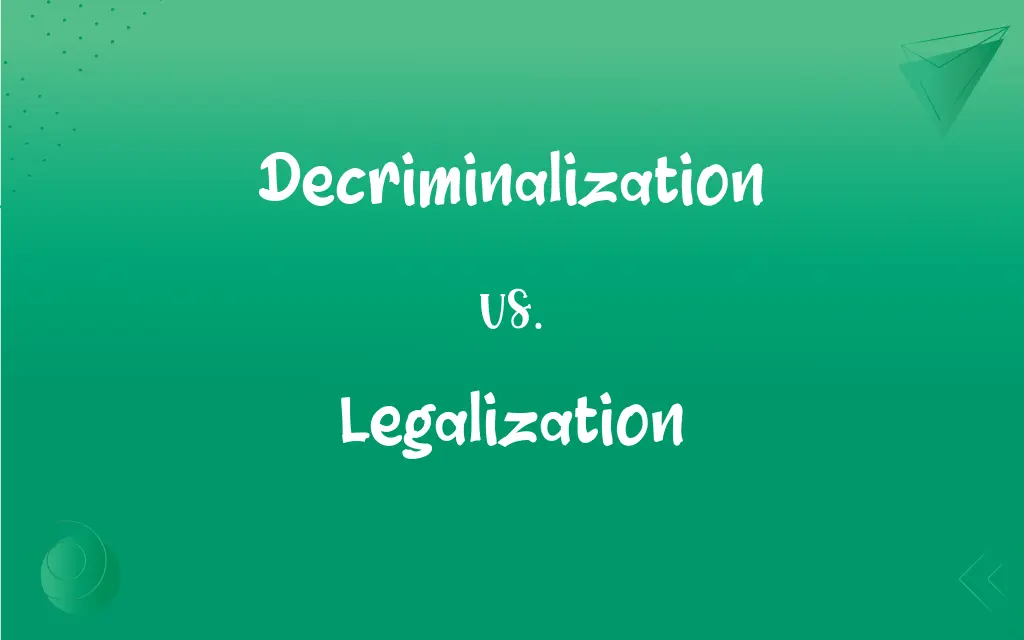Decriminalization vs. Legalization: What's the Difference?
Edited by Janet White || By Harlon Moss || Updated on October 10, 2023
Decriminalization reduces or removes legal penalties for certain acts; legalization makes those acts entirely legal and regulated.

Key Differences
Decriminalization is a process that reduces or removes the criminal penalties associated with specific actions or behaviors, meaning that while the act remains illegal, it doesn't lead to an arrest or criminal record. Legalization, in contrast, involves making a previously illegal act completely legal, often accompanied by a set of regulations and standards.
Under decriminalization, certain acts, especially minor offenses, might only result in a fine instead of jail time. Legalization, however, means there's no punishment whatsoever for those acts, and they're typically assimilated into a regulatory framework.
While decriminalization often represents a step towards more lenient policies and can help reduce the burden on legal systems, it doesn't address the potential benefits that come with a regulated, legal market that legalization might provide.
Decriminalization might be preferred when policymakers want to reduce the societal harm caused by strict laws but aren't ready to fully endorse or regulate the behavior. Legalization goes a step further, fully accepting the behavior and integrating it into society with proper oversight.
Both decriminalization and legalization can have significant impacts on society. Decriminalization can decrease the number of people incarcerated for minor offenses, while legalization can open new economic markets and generate tax revenues.
ADVERTISEMENT
Comparison Chart
Legal Status
Reduces/removes penalties but act remains illegal
Makes the act entirely legal
Penalties
Typically results in fines
No penalties and often involves regulations
Regulatory Framework
Limited or none
Comprehensive regulations and standards
Economic Impact
Limited impact on market
Can open up new markets and generate tax revenue
Societal Acceptance
Indicates a move towards leniency but not full acceptance
Indicates full societal integration of the behavior
ADVERTISEMENT
Decriminalization and Legalization Definitions
Decriminalization
Decriminalization is the reduction or removal of legal penalties for specific actions.
The decriminalization of marijuana possession might result in a fine instead of jail time.
Legalization
Legalization reflects societal acceptance and integration of certain behaviors.
The legalization of same-sex marriage marked a shift in societal values.
Decriminalization
Decriminalization aims to reduce the societal and legal burden of minor offenses.
Decriminalization can decrease the prison population by focusing on serious crimes.
Legalization
Legalization usually comes with regulations and oversight.
With the legalization of gambling, specific rules and monitoring systems were implemented.
Decriminalization
Decriminalization can be seen as a middle ground between prohibition and legalization.
Decriminalization often comes before full legalization in policy debates.
Legalization
Legalization means making a previously prohibited act completely lawful.
The legalization of cannabis in some states allowed for its sale and consumption.
Decriminalization
Decriminalization reflects a lenient approach without full societal endorsement.
Some countries choose decriminalization to observe societal impacts before considering legalization.
Legalization
Legalization can generate economic benefits through new markets.
The legalization of recreational marijuana created job opportunities and tax revenue streams.
Decriminalization
Decriminalization maintains an act's illegality but with milder consequences.
Even after decriminalization, selling certain substances might remain an offense.
Legalization
Legalization removes all penalties associated with an act and often brings it under a regulatory framework.
Post the legalization of alcohol, age restrictions and quality standards were introduced.
Decriminalization
To reduce or abolish criminal penalties for
Decriminalize the use of marijuana.
Legalization
To make legal or lawful; authorize or sanction by law
Legalize gambling.
Decriminalization
The act of making an activity or substance no longer criminalized (no longer a crime, subject to criminal penalties, to perform or possess). legalization, which often implies regulation.}}
The decriminalization of all plant-based psychedelics
Legalization
The process of making something legal, the process to legalize, decriminalization.
The hippies marched for the legalization of marijuana.
Decriminalization
The act of ceasing to treat a person as a criminal, by making their activities legal or no longer subjecting them to the criminal justice system (but instead possibly the mental healthcare system, etc).
Legalization
The act of making legal.
Decriminalization
Legislation that makes something legal that was formerly illegal
Legalization
The act of making lawful
FAQs
Can something be decriminalized but not legalized?
Yes, decriminalization reduces penalties but doesn't make the act entirely legal like legalization does.
Why might a country choose decriminalization over legalization?
A country might opt for decriminalization as a cautious step, assessing societal impacts before full legalization.
What does decriminalization mean for users?
Decriminalization means users might face milder penalties, like fines, instead of criminal charges.
Are there risks with legalization?
Yes, potential misuse or over-commercialization might occur, hence the need for regulations.
How does legalization impact the economy?
Legalization can create new markets, jobs, and potential tax revenues.
Is a regulated market always a result of legalization?
Often, but not always. Legalization typically leads to regulations for safety and quality control.
Can an act move from being decriminalized to legalized?
Yes, many acts or behaviors are first decriminalized before being fully legalized.
How does legalization deal with previous convictions?
Some legalizations come with provisions to expunge or reduce previous related convictions.
Are decriminalized acts free from regulation?
Generally, decriminalized acts have limited or no regulatory framework compared to legalized ones.
Which is a more progressive step, decriminalization or legalization?
Legalization is often seen as more progressive, signaling full acceptance and creating a regulatory framework.
Do both decriminalization and legalization indicate societal acceptance?
Decriminalization indicates leniency, while legalization typically suggests broader societal acceptance.
What's a common example of decriminalization?
Many places have decriminalized personal marijuana possession, opting for fines over incarceration.
Does decriminalization mean no consequences?
No, decriminalization typically means reduced consequences, like fines.
Does decriminalization lead to increased use?
Not necessarily. The impact varies depending on the substance or act and societal context.
Does legalization mean unrestricted access?
No, legalization often comes with age, quantity, or usage restrictions.
What are the societal impacts of decriminalization?
Decriminalization can reduce prison populations and refocus law enforcement efforts.
Do all countries have acts that are decriminalized?
No, policies vary widely. Some countries have no decriminalized acts, while others have several.
Can businesses operate under decriminalization?
Typically, no. Decriminalization often targets personal use, whereas legalization might allow regulated businesses.
What drives the move from decriminalization to legalization?
Factors like societal acceptance, economic potential, and successful examples from other regions.
Why might governments choose legalization?
For economic benefits, societal acceptance, or addressing issues like black markets.
About Author
Written by
Harlon MossHarlon is a seasoned quality moderator and accomplished content writer for Difference Wiki. An alumnus of the prestigious University of California, he earned his degree in Computer Science. Leveraging his academic background, Harlon brings a meticulous and informed perspective to his work, ensuring content accuracy and excellence.
Edited by
Janet WhiteJanet White has been an esteemed writer and blogger for Difference Wiki. Holding a Master's degree in Science and Medical Journalism from the prestigious Boston University, she has consistently demonstrated her expertise and passion for her field. When she's not immersed in her work, Janet relishes her time exercising, delving into a good book, and cherishing moments with friends and family.
































































